On my last trip to Tunisia, I went a little bit overboard when buying food products. At the airport, our suitcases weighed 90kg! I am not blaming only the food products… I thought a ceramic set for six persons will fit in the suitcases smoothly, as well as ceramic cookware. So, if you have been thinking about what to buy from Tunisia? The list of 29 food products will help you out! But, please be kind to yourselves and think about how to get those to home also.
Also, check out this article where I have presented 13 things to buy from Tunisia.
But now, let’s dive in! Shall we.
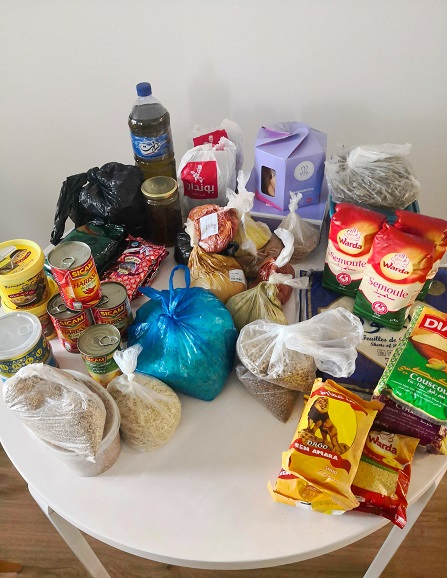
What to buy from Tunisia? The list of 29 food products.
- Olive oil
- Honey
- Harissa
- Dates
- Malsouka sheets
- Coffee
- Black tea
- Green tea
- Tisane
- Frik
- Nwasser
- Lentils
- Couscous
- Semolina
- Hlalem
- Millet
- Mint
- Thyme
- Bay leaves
- Tabil
- Chili and paprika powder
- Turmeric
- Chamia
- Zgougou
- Jam of quince or figs
- Droo
- Biscuits and pastries
- Bsissa
- Molokhia powder
What to buy from Tunisia? The most important food products
1. Olive oil
Happens to be that Tunisia is one of the world’s top olive oil producers, and their olive oils have won medals at international competitions. If you are looking for 2021 award-winning Tunisian olive oils. Check the Tunisian winners in The NYIOOC World Olive Oil Competition, which is the world’s largest and most prestigious olive oil contest.
I always bring a bottle or two of high-quality olive oil from Tunisia. The olive oil that I bring with me is from relatives’ olive oil fields. It’s super delicious, rich in aroma, almost creamy texture, and the best part is that it’s made of hand-picked olives. There are many good reasons to purchase a bottle of Tunisian olive oil. Firstly, olive oil is famous for its’ health benefits in cholesterol, obesity, heart health, inflammation, etc. Secondly, its’ a must-have cooking product in every kitchen. Thirdly, it makes an excellent souvenir.
2. Honey
Every country has its’ own specific flora that strongly affects honey. Even the honey is made of the same floral source, the taste, color, and texture vary a lot depending on where the honey is from. That is why you definitely should buy or at least try the Tunisian honey.
As I mentioned before that olive oil is beneficial for health so is honey. Also, it’s a perfect addition to your breakfast table. Sprinkle over the crepes, season your smoothies, pour over the natural yogurt, glaze your toasts with honey and sweeten your hot beverages. I get my honey from a relative who happens to be a beekeeper.
3. Harissa
Hear me out, my friends of spicy food. Harissa is a Tunisian hot chili pepper paste. It is made of dried chili peppers, olive oil, garlic, salt, caraway, and coriander. On your stay in Tunisia, very fast you get to know this hot chili paste as it’s served everywhere and all the time. It’s an important ingredient in many Tunisian traditional dishes, widely used in different kinds of street food, in restaurants the harissa is often served on the small plate with some olive oil and mayo, you find it inside crepes, omelets, baguettes, and some people eat it just like that directly from the can.
If you are thinking about what to buy from Tunisia? The answer is harissa. I always buy harissa on my trips, and I give it as a souvenir to my friends who like spicy foods. Now you have harissa, and what you should do with it? There are multiple ways to use it: mix it in scrambled eggs, spread it in a baguette, use it to marinate meat, chicken, or fish, add it in pasta sauces, etc. And if you are interested to cook some Tunisian dishes, normally harissa is one of the important ingredients.
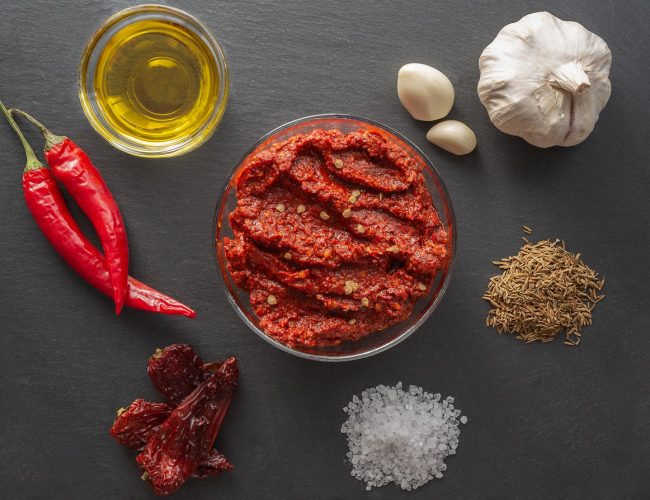
4. Dates
Tunisia is one of the world’s biggest producers and exporters of dates. Most of the date palms grow around the areas of Kébili, Tozeur, and Gabès. There the climate is suitable for palms to produce delicious dates. In the world, there are hundreds of date types. Divided into groups: soft, semi-dry and dry depending on how moist is the date. The most produced date in Tunisia is Deglet Nour “finger of light” other typical dates are Allig, Khouat Allig, and Kenta.
The date is a very versatile fruit. There are available plenty of products that are extracted directly from date fruits: honey, vinegar, syrup, oils, and powders. I love dates and that’s why I eat those a lot during my visits to Tunisia. And of course, I buy some to bring with me to my home country. The dates make a perfect snack! Sometimes, I like to fill up the dates with butter, ricotta, or PeanutButter. I also use those in smoothies, baking (energy balls, Bundt cake), and chopped and mixed into natural yogurt.
5. Malsouka sheets
One of the most traditional dishes in Tunisia is Brik. It’s a very essential part of Tunisian cuisine. Also, a typical dish to make at home and sell at fast-food restaurants. Tunisian Brik is a crispy deep-fried pastry filled with a savory filling. Eating a Brik should be on your Tunisian bucket list. And a great thing is that also kids love this dish.
Might be that you start to crave these crispy pastries in your home country. To make cooking Briks easy at home. I recommend buying malsouka sheets from Tunisia as finding those outside Tunisia is more challenging. In Tunisia, you can buy malsouka sheets from almost every grocery store. It’s a great idea to buy a couple of packages with you as they are well preserved.
Here you find a recipe to make Traditional Tunisian Brik with Tuna.
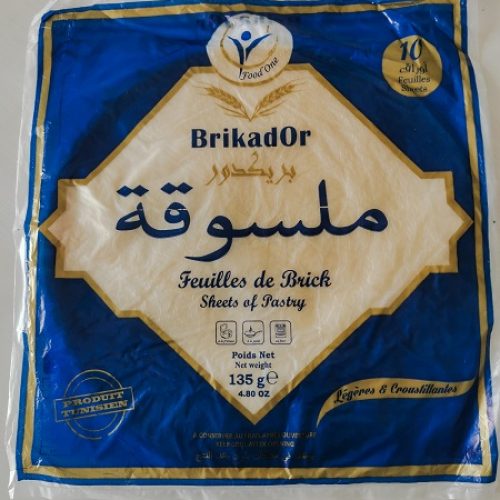
What to buy from Tunisia? Drinkable products
6. Coffee
Coffee is one of my favorite drinks, and I drink it a lot. I guess I drink it too much. I like the most filter coffee, americano, espresso, Moka pot coffee, and Arabic/Turkish coffee. Served without sugar and milk that I can taste the coffee itself. On my visits to Tunisia, I spend hours in cafes, and I consume too much coffee.
Every single trip, a package of Tunisian coffee ends up in my suitcase. Most of the time, I buy Bondin coffee. It’s a leading coffee brand in Tunisia and part of the Ben Yedder group. ) A couple of Bondin stores are located in Tunis. There I buy the coffee that I need. As you can tell how you want your coffee to be grounded: espresso, Arabic coffee, or filter coffee. Or you can buy prepackaged coffee.
I advise you to buy at least one package for yourself and one for your friend. Just keep in mind that coffee starts to lose its’ freshness after roasting. Buy an amount of coffee that you can consume when it’s still fresh. The old coffee starts to lose the freshness but also aroma, taste, and its’ charm. At the home store, your beans in an opaque, air-tight container and place them in a dark and cool location.
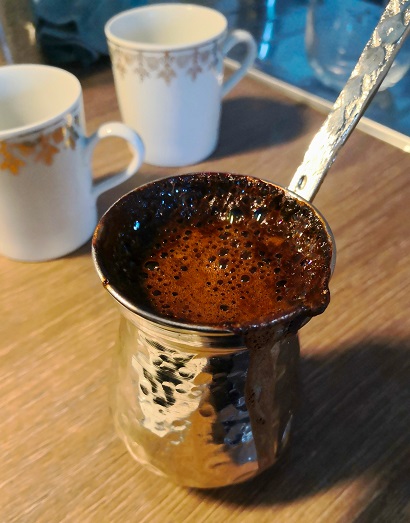
7. Black tea
When visiting a Tunisian family, it’s common that they offer coffee or tea. One typical tea drink is called thé rouge which means red tea. But actually, it’s made of black tea leaves. This “red tea” is made of black tea leaves, sugar, and mint. The tea is boiled for a long time so that tea becomes very strong. This tea is very delicious and very Tunisian. See a picture of the tea package below. It can be purchased from the grocery store.
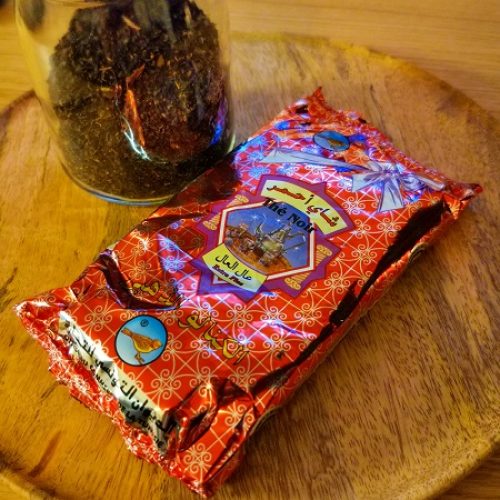
8. Green tea
In Tunisia, green tea is boiled together with sugar and mint. In the beginning, the tea leaves are rinsed with hot water. Then the tea is boiled with sugar and mint until the flavors are well combined. During the boiling, the tea is mixed by pouring tea into the glass and then back to the teapot. This kind of mixing is repeated a couple of times. In the end, glasses are filled with fresh mint, and tea is poured over them. The pack of green tea is a great souvenir for tea lovers. The tea below can be found in the grocery store.
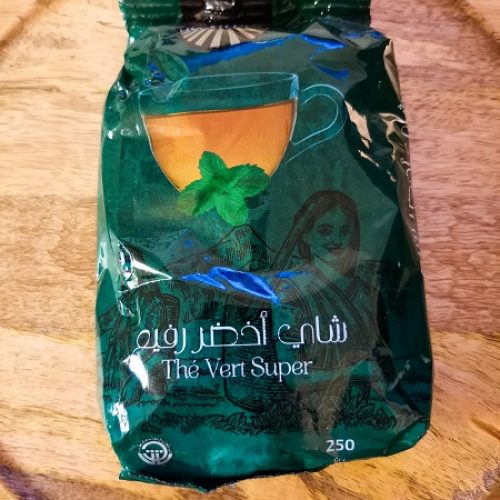
9. Tisane
Tisane means herbal infusion or any plant-derived drink but not tea. From Tunisia, I have bought a tisane named lemon Verbena. Drinking tisane is beneficial for the digestive system, relaxation, and stomach cramps. It is said to promote a good night’s rest and being high in antioxidants.
What to buy from Tunisia? Dry products
10. Frik
Frik is barley semolina that is widely consumed in North Africa. Frik is used to make popular North African soup Chorba. This soup is very popular also in Tunisia, especially during the holy month of Ramadan. I have found it very difficult to find ground barley semolina from my country. In case, you are looking for barley semolina or you are willing to make Chorba, I recommend buying it from Tunisia. Frik is sold ground to a fine, medium, and coarse size.
11. Nwasser
Nwasser is the name of a popular Tunisian chicken dish. Made of “pasta” called nwasser, chicken, vegetables, and spicy tomato sauce. Super delicious meal! Nwasser pasta isn’t widely sold outside Tunisia, and that’s why I buy it always from Tunisia. Nwasser pasta dough is made of semolina, flour, water, oil, and salt. The dough is rolled thinly and sprinkled with starch. Then it is dried under the sun for a couple of hours. After that, the dough is folded and cut into squares of 1*1 cm. This is a great souvenir for foodies who are looking for something new.
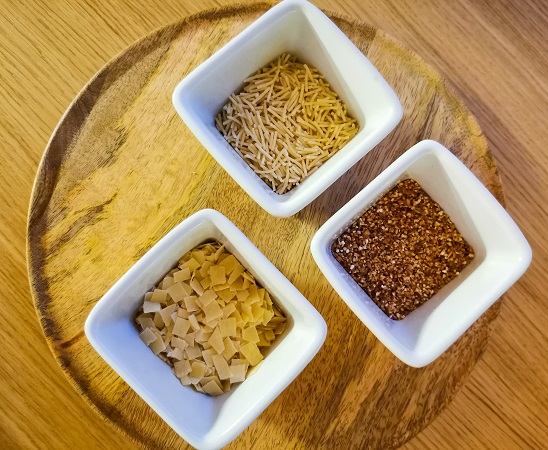
Up: Hlalem, Right: Frik and Left Nwasser
12. Lentils
Lentils are available almost everywhere but I still like to buy some green lentils from Tunisia. Those are cheaper and I enjoy buying those from the stores where you scoop the product into the bag by yourself. Plus, I use a lot of lentils in salads, soups, and side dishes. I understand if you don’t want to carry lentils from Tunisia to home but I encourage you to use lentils. Lentils are super healthy!
13. Couscou
Sometimes, I find myself filling up my luggage with couscous packs. Now, I am having a bit of a hard time justifying why you should do that. Well… I guess, in case you do not have Tunisian couscous in stores. Then you should bring it from Tunisia. As, of course, the Tunisian couscous is the best 😉
14. Semolina
I buy always a couple of packages of very fine semolina from Tunisia. I use it to make Mlawi and also in some other bread doughs. I purchase a Tunisian semolina brand, that isn’t available in my country. If your plan is to make a mlawi or some other bread. Pay attention to buying very fine semolina, if the semolina is too coarse the dough is ruined.
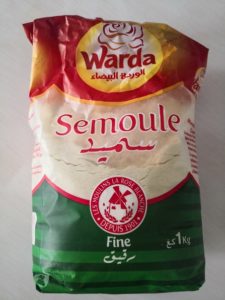
15. Hlalem
Hlalem is the same thing as Vermicelli. It’s pasta that is shaped very thinly. The hlalems are popular in Tunisia and commonly used in hot soups that are often eaten during winter and Ramadan. I must say that spicy and warming Hlalem soup is perfection on cold winter days.
16. Millet
I have noticed that Tunisian people take the shapes of pasta very seriously. Some dish needs a specific shape of pasta, and it can be substituted with another. So, millet is one of many pasta shapes. Millets are small and oval-shaped. Smaller than the so-called bird tongue pasta. It’s made of durum wheat semolina, and it’s mainly used in soups.
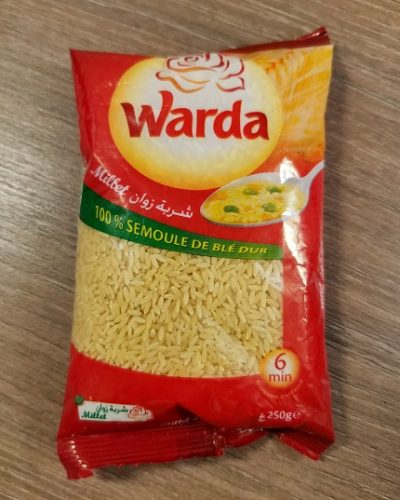
What to buy from Tunisia? Spices
17. Mint
Tunisia is full of spice and herb merchants. Now, you have a perfect opportunity to fill up your spice cupboard. Plenty of spices to choose from, and the prices are very reasonable. The first herb I recommend you to buy is dried mint. Both fresh and dried mints are very typical ingredients in Tunisian cuisine. The fresh mint is mainly used in teas and dried one in cooking. Purchase dried mint from the store or buy a fresh mint bunch, and air-dry it. During the summertime, it takes only a couple of hours. And the airily hanged mint bouquet has dried.
A great tip is to add dried mint in salads! Yummy! Or try to pair it with a smoothie, lamb and beef meat, drinks, herb dressing, and fruits.
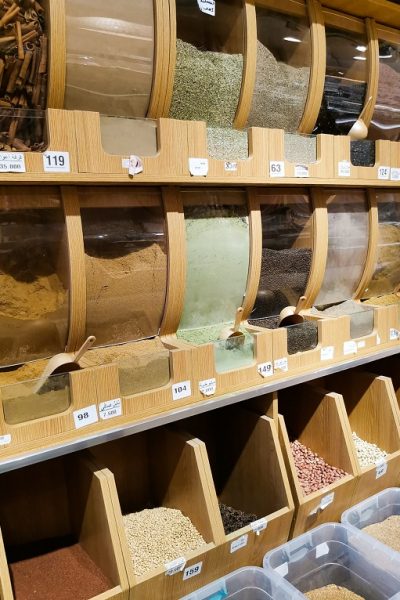
18. Thyme
Thyme must be one of the most commonly used herbs in the world and used in several cuisines, also in Tunisia. Drying herbs is popular in Tunisia as the weather is very suitable for that. Also, my thyme bunch has been dried at home. In Tunisia, thyme is used in many dishes. To marinate meat and poultry, in stews, and sauces.
19. Bay leaves
Tunisian cuisine includes a lot of bay leaves. Also, I like to use a lot of bay leaves in my cooking. Often, I fill up a little jar or box with bay leaves and bring it to my home country. In Tunisian cuisine, bay leaves are used in pasta, stews, couscous, marinades, and soups. Even to season the boiling water for pasta (it’s a great tip, so try it out!)
20. Tabil
Tabil is one of the most popular spices in Tunisian cuisine and is also commonly used in North African cooking. Tabil mix has a warming and earthy flavor. It’s a spice blend made of coriander, cumin and caraway seeds, red pepper flakes, dried garlic, black pepper, bay leaves, ginger powder, dried mint, and salt.
Tabil has become one of my favorite spices, and I use it a lot. This traditional Tunisian spice blend is perfect for marinating meat, stews, and roasted vegetables. Tabil is also an important ingredient in many traditional Tunisian dishes like Ojja, couscous, Osben, Mloukhia, and pasta.
21. Chili and paprika powder
Paprika powder is a spice made of grounded dried peppers. Some of the paprika and chili powders are very mild in taste adding bitterness and a touch of fruitiness to a dish. Others add plenty of heat to the dish. This versatile spice can be used in marinades, stews, sauces, and soups. It also goes well with poultry, meat, fish, seafood, and vegetables. If you have friends who like cooking, with this spice souvenir you can’t go wrong. It is an essential ingredient for every kitchen.
22. Turmeric
Golden turmeric is famous for its many health benefits. Being rich in both color and flavor, it adds earthy bitterness and depth to the food. It’s often paired with fats like ghee, butter, cheese, or coconut oil to balance the strong taste. In Tunisia, it is used in meat and poultry dishes: Klaya, Nwasser, and Djej Mosli. It also gives the yellow color and flavor for traditional Tunisian Tajine.
On my last trip to Tunisia, I bought 500 grams of turmeric, and it cost 3TN. It is very affordable! The negative side of turmeric is that it stains everything it touches: hands, tables, clothing, cutting board, and plastic jars. So, pay attention when using it.
If you are looking for more information about Tunisian spices, check this article where I introduce the most popular Tunisian spices.
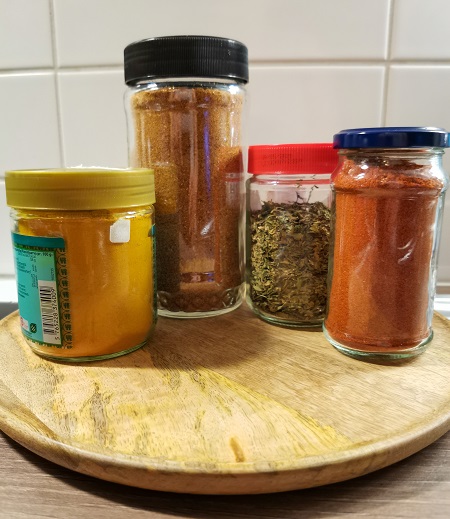
Left: Turmeric, Tabil, Mint and Chili powder
What to buy from Tunisia? If you are looking for something special
23. Chamia
Halwa Chamia is a traditional Tunisian delicacy made of Tahina sesame paste. There are many versions of Chamia: natural one or seasoned with pistachio, almonds, nut mix. In Tunisia, Chamia is a very typical breakfast. Chamia is enjoyed with Mlawi, inside a baguette, or on top of the droo or toast. The flavor of Chamia is sweet but a little bit bitter. It’s very popular among children but also adults. My favorite Chamia is one with pistachios, so try it out!
24. Zgougou
If the plan is to make Tunisian dessert Assidet Zgougou. Then it’s advisable to buy finely ground grains of Aleppo tree as it makes cooking a Zgougou much easier. Every year we make Zgougou at home. That is why we bring the premade Aleppo tree paste from Tunisia, as it’s not sold in my home country. But if you are not willing to try or cook Assidet Zgougou, do not buy it, as I don’t know any other way to use this paste. Maybe you know?
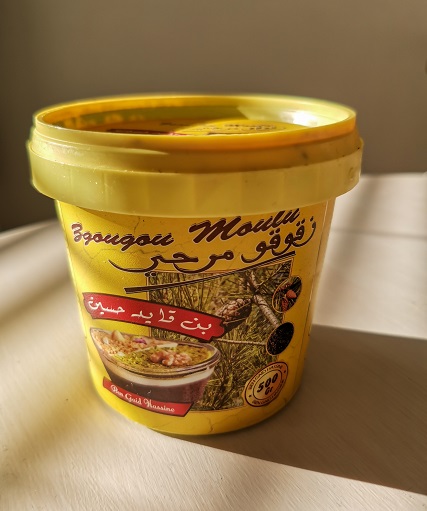
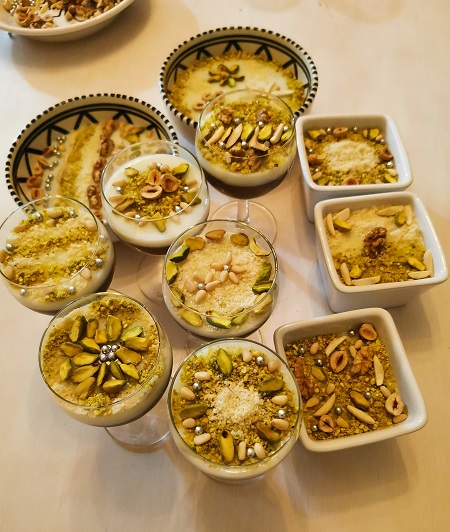
25. Jam of quince or figs
Khchef “confiture coing” is jam or confiture made of quince. Might be that you have never heard of quince fruit. It’s yellow, pear-shaped fruit. Khchef is a popular Tunisian confiture that is made of quinces. This jam is perfect with toast or baguette. Try it also with different kinds of cheeses. Very delicious!
Another tasty option is a fig jam, which is very popular in Tunisia. I love fresh figs, and on my trips to Tunisia, I consume a lot of those. I also love fig jam. It’s perfect on the top of the toast, on the cheese platter, in cooking, and in baking. So, grab a small jar of Tunisian fig jam to take home.
26. Droo
Droo, known also as crème de sorgho, is a very typical and traditional Tunisian breakfast. Droo is made of sorghum powder. Sorghum grains are gluten-free and very rich in nutrition, and also high in fiber and protein. For this reason, droo is a very popular dish among physical labor workers, and during Ramadan.
The droo is made of sorghum powder, that is boiled with water and sugar. After some time of boiling, it becomes firm pudding. The prepared pudding is decorated with peanuts and Chamia (sesame seed paste). I must say that it’s a great breakfast! Eating one bowl of it keeps me full for a long time. In case, you are looking for something traditional and typical Tunisian product to buy, then this is a great option.
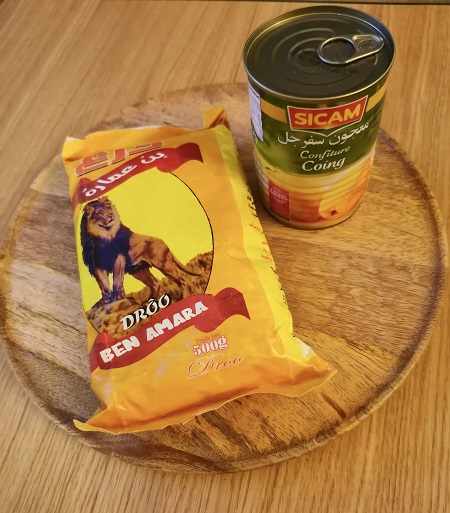
27. Biscuits and pastries
What to buy from Tunisia if you are a person with a big sweet tooth. Tunisia has a strong love for sweets, including both traditional Tunisian sweets as well as Western treats. Tunisia offers a great range of handmade sweets, crunchy cookies, and delightful pastries. Fill up a box with Tunisian sweets like Makroudh, Samsa, Zouza, Kaak, and Baklava. It’s a great souvenir for a person who loves everything sweet. Check this post, where I have presented 10 popular Tunisian sweets, to get some inspiration.
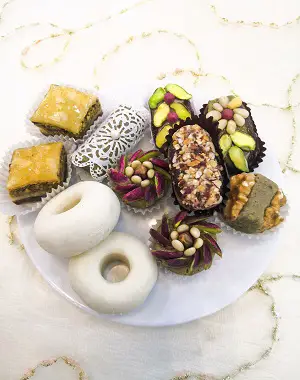
28. Bsissa
We can say that Bsissa is pure gold when it comes to nutritious richness. It’s an energetic food that is made of a mix of cereals, roasted vegetables, and spices. That makes Bsissa rich in protein, slow sugar, fiber, minerals, calcium, and iron. The spices have an anti-inflammatory effect and helps also digestion.
So how do you make and consume Bsissa? There are two versions: firm and drinkable one. Bsissa is a powder that is mixed with olive oil and sugar or honey. When it’s made like this, it has quite a firm texture and is eaten with a spoon. During the summer, more common is to mix the bsissa powder with ice-cold water and sugar or honey. And then you drink it.
So, on your visit to Tunisia, buy a couple of packages of Bsissa. This is a very typical Tunisian food, so you must try it! It’s a great way to start the morning, but also it makes a perfect snack between the meals and after a workout.
29. Molokhia powder
Mloukhia is also known as molokhia, is a powder made of herb Jew’s Mallow. In Tunisia, this herb powder is used as the main ingredient in a festive dish called Mloukhia. It’s a lamb stew cooked traditionally for many hours. The dish has a dark green color and a very unique taste. Mloukhia powder is an essential part of Tunisian cooking, but it’s not the most versatile spice to have in your kitchen. But if you are looking for something unique, then buy a small amount and try to make Mloukhia at home.
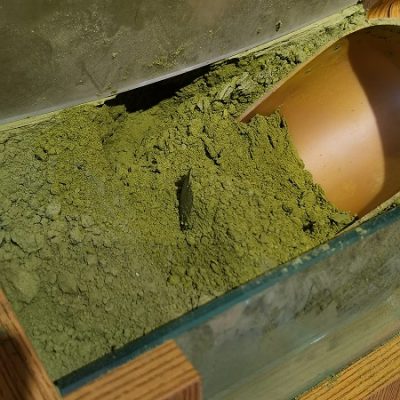
I wish that enjoyed reading this little listing of “What to buy from Tunisia? The list of 29 food products”. Hopefully, after reading this buying food products and souvenirs will be a bit easier. In addition, I would like to wish you a happy shopping in Tunisia.
If you are craving some more reading, check out these.
10 Fascinating facts about Tunisia
Top 10 places to start discovering Tunisia
Guidelines for smoking, drinking and partying in Tunisia

